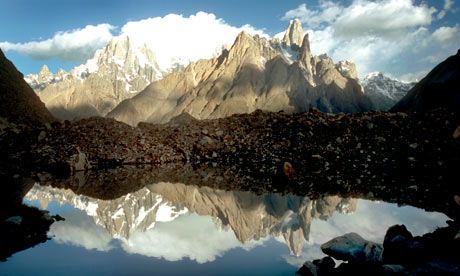From our presentation on Tuesday, I learned that 75 percent of the worlds fresh water is preserved in glaciers. Glaciers in the Himalayas provides water for over 1.3 billion people, I think that increased fresh water runoff could help benefit these neighboring communities. With a growing population, don't we need more fresh water? and isn't it easier to distribute while its flowing down the sides of a mountains and not frozen up in high altitudes. I can see negative aspects from glaciers receding too much as well. At what point do the glacier's go from being a renewable resource to finite.
Another idea I always think about when I think about all that water flowing down the sides of a mountain is energy. Are we able to manipulate the flow over water down a mountain and turn it into energy? Or can we dam the fresh water and use it to irrigate more crops for our growing population. As important as it is to understand why our climate is changing, and how to slow down the changing climate, I think its just as important to begin studying how we are going to cope with the changes of climate in a positive fashion.
After all this talk about glaciers in Tuesday's class got me reminiscing about my past travels, so I thought I would share a little travel story I have with Glaciers.

I went to visit Franz Josef Glacier in New Zealand back in 2009 as a part of a Contiki tour. We started the tour off with a valley walk, towards an oncoming stream of glacier water. The valley walls were high with the reminiscent striations of the old glacial moraines. A small water fall trickled over the side from another mountain top. We continued climbing towards the glacier until we approached it head on, and then snuck around the side through a carved out path to get on top of it. We wore our trekking shoes with spikes for extra grip on the mass of ice and snow, and had walking sticks just for extra balance. As we continued to climb up the toe of the glacier workers were carving out an ice stair case to make it easier to go up higher for the tours. We had to cross large open gaps in the glacier, which we were told could easily slip one of us down and into the glacier forever (or at least till we were melted out). At this point we had the opportunity to take a helicopter tour of the glacier and land near the top to get a feel of the size of the glacier, and some extra hiking along the top of the ice ground. We decided to just stay on our walking tour this time. Unfortunately for this great tourist expedition I went on, they have closed the entire hike up to the front of the glacier and made it only possible to access the glacier by helicopter, which makes it less accessible to backpackers with smaller budgets. This glacier has been receding since 2008, and due to a hole in the glacier and re occurring ice quakes it is no longer safe to do what I thoroughly enjoyed doing at this spot.
**Check out Laura Mills article on the Franz Josef Glacier at http://www.nzherald.co.nz/nz/news/article.cfm?c_id=1&objectid=10818264 and be sure to look at the 2008 -2012 photo comparisons.
**I also suggest taking the helicopter up to the glacier if you're in the area. It really was a great experience. Check out this website for more information: http://www.franzjosefglacier.com/
The majority of Glaciers in the world we hear about in terms of climate change is resulting in receding ice fronts, I did a little bit of digging and found one story where this run off could have positive effects. There has been a study in 2009 in the Gulf of Alaska that looks at the runoff from glaciers, and sees a positive effect it has on the ecosystem. The runoff from ancient glaciers is providing bio-available organic carbon for coastal ecosystems in the area. This area produces some of the most productive fisheries in the United States, the study believes that future changes to the glacier could affect the food webs in the area.
**To read more, check out Anthony Watts article at http://wattsupwiththat.com/2009/12/28/glacier-melt-discovered-to-have-an-upside/
 |
| Photograph: David Bathgate/Corbis |
**Ian Garland writes more about the growing Karakoram Range at http://www.dailymail.co.uk/sciencetech/article-2130184/Forget-global-warming-Scientists-discover-glaciers-Asia-getting-BIGGER.html#axzz2KEnpn086
Even if I didn't come up with any answers on how to change to this environment, I hope I can challenge everyone else to create innovative ideas on how to gain a positive change with our new climate, instead of only focusing on keeping things the way they are. It really does seem to me that the negative really does out weight the positive effects on this issue and from what I've read it seems most important right now to understand why things are changing at the rate that they are and how we can control it.
**For additional positive effects of Global warming, check out the Environmental Graffiti website at http://www.environmentalgraffiti.com/offbeat-news/the-top-5-positive-effects-of-global-warming/728?image=5
